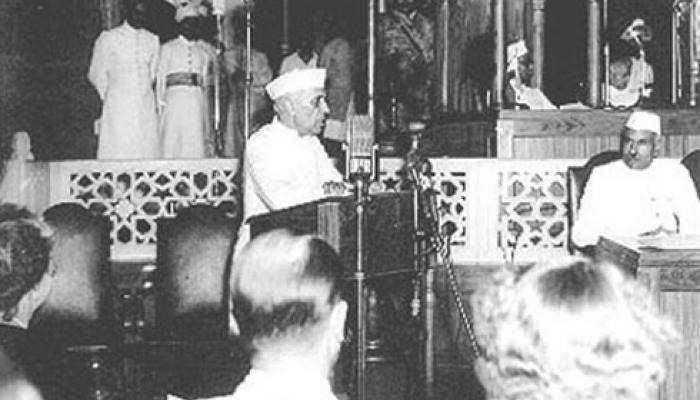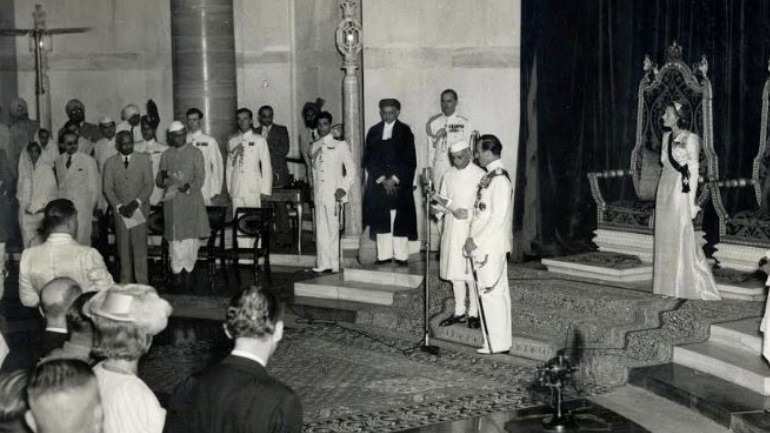The Historic Day of 1947: Nehru's Vision and Gandhi's Warnings to the New Government

On August 15, 1947, India achieved independence from British rule at the stroke of midnight, marking the end of nearly 89 years of British occupation. The transfer of power was formalized through an Act passed by the British Parliament on July 4, 1947, handing over authority to India's Legislative Council. The celebrations commenced on the evening of August 14, with the official function starting at 11 PM. During this momentous occasion, "Vande Mataram" was sung as the national anthem, a song later officially declared as the National Song of India.

Nehru’s ‘Tryst with Destiny’ and the New Cabinet
The Central Hall of Parliament hosted the official event where three key figures delivered speeches. Pandit Jawaharlal Nehru, who later became India's first Prime Minister, addressed the gathering with his renowned "Tryst with Destiny" speech. Nehru reflected on the 1929 Lahore Congress and proclaimed, "Long years ago we made a tryst with destiny, and now the time comes when we shall redeem our pledge, not wholly or in full measure, but very substantially. At the stroke of the midnight hour, when the world sleeps, India will awake to life and freedom."
Nehru's cabinet included 13 ministers from diverse political backgrounds. Notable non-Congress members were Dr. B.R. Ambedkar and Shyama Prasad Mukherjee, each leaving a significant impact on India’s political landscape. The BJP and Congress today continue to draw inspiration from their legacies, with the BJP aligning with Mukherjee’s ideology and Congress closely associated with Nehru's contributions.
Independence Day Celebrations: A Question of Timing
Interestingly, some historical accounts suggest that the Independence Day celebrations were initiated a day early based on astrological advice. Astrologers reportedly advised that August 15, 1947, was not an auspicious date for the festivities.

Mahatma Gandhi’s Solemn Observance
While New Delhi buzzed with joyous celebrations, Mahatma Gandhi, the Father of the Nation, chose to observe Independence Day with solemnity. Gandhi, who had expressed concerns about the communal tensions between India and Pakistan, refrained from participating in the celebrations. He believed that the freedom achieved came with underlying seeds of future conflict. In July 1947, Gandhi stated, "I cannot rejoice on August 15. I do not want to deceive you. But, at the same time I shall not ask you not to rejoice. Unfortunately, the kind of freedom we have got today contains also the seeds of future conflict between India and Pakistan."
Gandhi’s Peace Efforts in Calcutta
At the time of independence, Calcutta (now Kolkata) was engulfed in communal riots. Mahatma Gandhi traveled to the city on August 9, 1947, to foster peace amid the turmoil. Despite suggestions to visit Noakhali, Gandhi remained in Calcutta, believing that restoring peace there would help stabilize the entire region. His presence and efforts eventually led to significant improvements in the city's situation, earning praise from contemporaries. Lord Mountbatten remarked on Gandhi’s success, contrasting it with the large-scale rioting in Punjab despite the presence of 55,000 soldiers.
Gandhi’s Personal Observance of Independence Day
On August 15, 1947, Gandhi marked the day by fasting for 24 hours, engaging in prayers, and spinning khadi yarn. His reflections on the day were documented in the Collected Works of Mahatma Gandhi, which includes a letter to his friend Agatha Harrison, where he expressed his gratitude and prayers for the occasion. During visits from West Bengal's new Governor C. Rajagopalachari and local students, Gandhi advised the newly appointed ministers to remain humble and avoid the temptations of wealth. He concluded his day with a public rally at Rash Bagan Maidan, emphasizing the need for genuine harmony between Hindus and Muslims.
